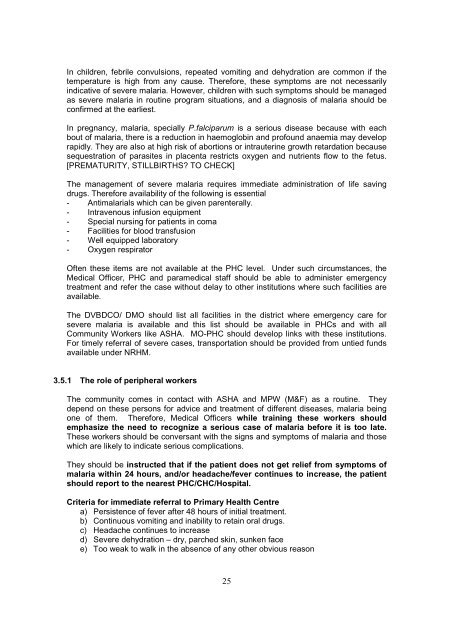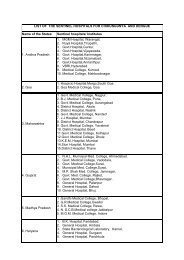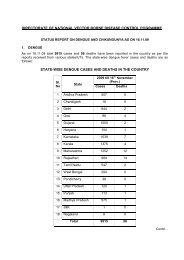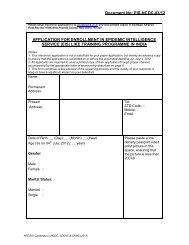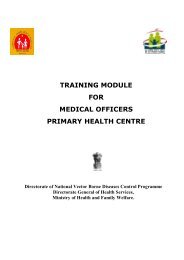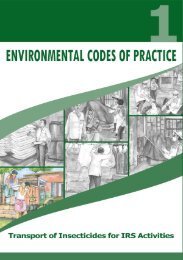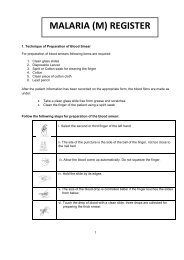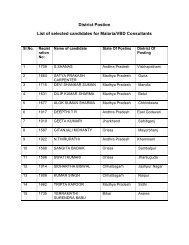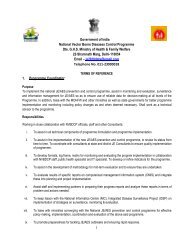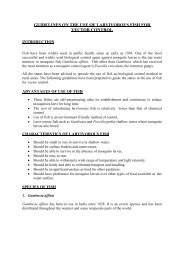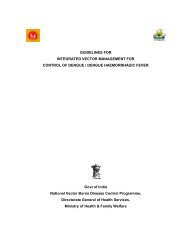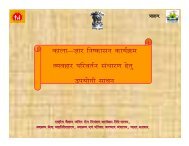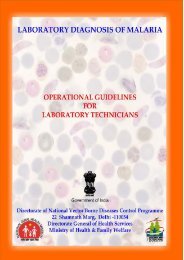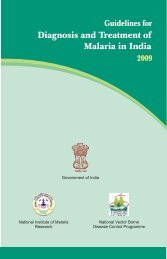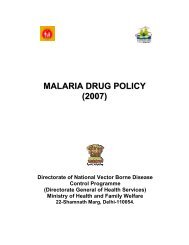Training Module for Medical Officer - NVBDCP
Training Module for Medical Officer - NVBDCP
Training Module for Medical Officer - NVBDCP
You also want an ePaper? Increase the reach of your titles
YUMPU automatically turns print PDFs into web optimized ePapers that Google loves.
In children, febrile convulsions, repeated vomiting and dehydration are common if thetemperature is high from any cause. There<strong>for</strong>e, these symptoms are not necessarilyindicative of severe malaria. However, children with such symptoms should be managedas severe malaria in routine program situations, and a diagnosis of malaria should beconfirmed at the earliest.In pregnancy, malaria, specially P.falciparum is a serious disease because with eachbout of malaria, there is a reduction in haemoglobin and profound anaemia may developrapidly. They are also at high risk of abortions or intrauterine growth retardation becausesequestration of parasites in placenta restricts oxygen and nutrients flow to the fetus.[PREMATURITY, STILLBIRTHS? TO CHECK]The management of severe malaria requires immediate administration of life savingdrugs. There<strong>for</strong>e availability of the following is essential- Antimalarials which can be given parenterally.- Intravenous infusion equipment- Special nursing <strong>for</strong> patients in coma- Facilities <strong>for</strong> blood transfusion- Well equipped laboratory- Oxygen respiratorOften these items are not available at the PHC level. Under such circumstances, the<strong>Medical</strong> <strong>Officer</strong>, PHC and paramedical staff should be able to administer emergencytreatment and refer the case without delay to other institutions where such facilities areavailable.The DVBDCO/ DMO should list all facilities in the district where emergency care <strong>for</strong>severe malaria is available and this list should be available in PHCs and with allCommunity Workers like ASHA. MO-PHC should develop links with these institutions.For timely referral of severe cases, transportation should be provided from untied fundsavailable under NRHM.3.5.1 The role of peripheral workersThe community comes in contact with ASHA and MPW (M&F) as a routine. Theydepend on these persons <strong>for</strong> advice and treatment of different diseases, malaria beingone of them. There<strong>for</strong>e, <strong>Medical</strong> <strong>Officer</strong>s while training these workers shouldemphasize the need to recognize a serious case of malaria be<strong>for</strong>e it is too late.These workers should be conversant with the signs and symptoms of malaria and thosewhich are likely to indicate serious complications.They should be instructed that if the patient does not get relief from symptoms ofmalaria within 24 hours, and/or headache/fever continues to increase, the patientshould report to the nearest PHC/CHC/Hospital.Criteria <strong>for</strong> immediate referral to Primary Health Centrea) Persistence of fever after 48 hours of initial treatment.b) Continuous vomiting and inability to retain oral drugs.c) Headache continues to increased) Severe dehydration – dry, parched skin, sunken facee) Too weak to walk in the absence of any other obvious reason25


